
Ever wonder why your first few years of life are a complete blank? You know you learned to walk, talk, and probably threw some epic tantrums, but you can’t recall any of it.
Here’s the kicker: You actually DID form memories as a baby. Scientists just figured this out, and it’s blowing minds everywhere.
Ready for the plot twist? Those “lost” baby memories might still be hiding in your brain right now.
The Mystery That Stumped Scientists for Over a Century
🧠 The Scientific Journey to Understanding Baby Memories
Caroline Miles
First scientific report of childhood memory loss in American Journal of Psychology
Henri & Henri
Systematic surveys establish first quantitative boundary at 3 years, 1 month
Freud’s Theory
Sexual repression theory dominates (later debunked by modern research)
Patricia Bauer
Longitudinal studies reveal children “grow into” their amnesia
Yale Breakthrough
Brain scans prove babies DO form memories – it’s a retrieval problem
Let’s start with something wild. You were basically a learning machine for your first three years. You figured out language, mastered walking, and developed your entire personality.
Yet you can’t remember a single moment of it.
This phenomenon has a name: infantile amnesia. And until recently, scientists thought they had it figured out. “Babies can’t form memories,” they said. “Their brains aren’t developed enough.”
Wrong.
2024 research from Yale University just shattered that theory. Using brain scans on awake babies (yes, that’s as challenging as it sounds), researchers discovered something incredible.
Babies as young as 12 months show brain activity that screams “I’m making memories!” Their hippocampus—the brain’s memory center—lights up just like yours does when you’re encoding experiences.
So if babies can make memories, why can’t you remember being one?
Your Baby Brain Was Like a Construction Zone on Steroids
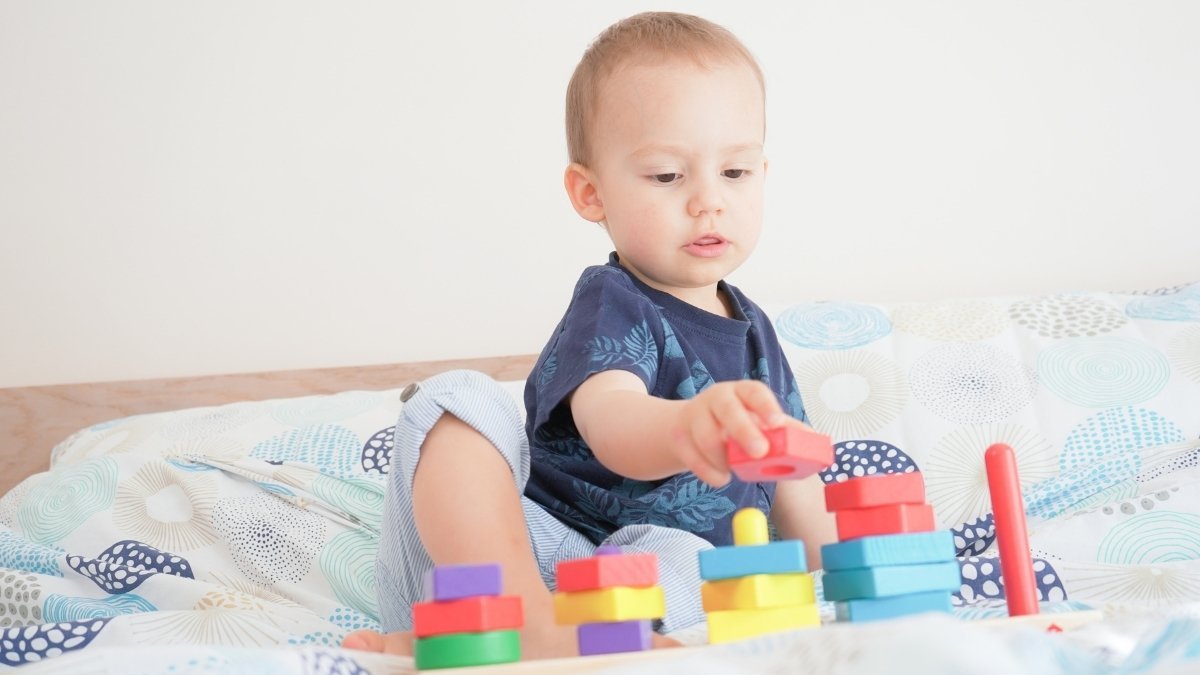
Your baby’s brain was the world’s most chaotic construction site. Every single second, workers (neurons) were building 1 million new connections while tearing down old ones.
The numbers are absolutely bonkers:
- Your brain doubled in size during your first two years
- Gray matter increased by 149% in year one alone
- Your hippocampus grew 13% between ages 1-2
It’s like trying to save files on a computer that’s constantly updating its operating system. Some data gets lost in translation.
But here’s where it gets really interesting. This isn’t a bug—it’s a feature.
The Great Memory Shuffle (And Why It’s Genius)
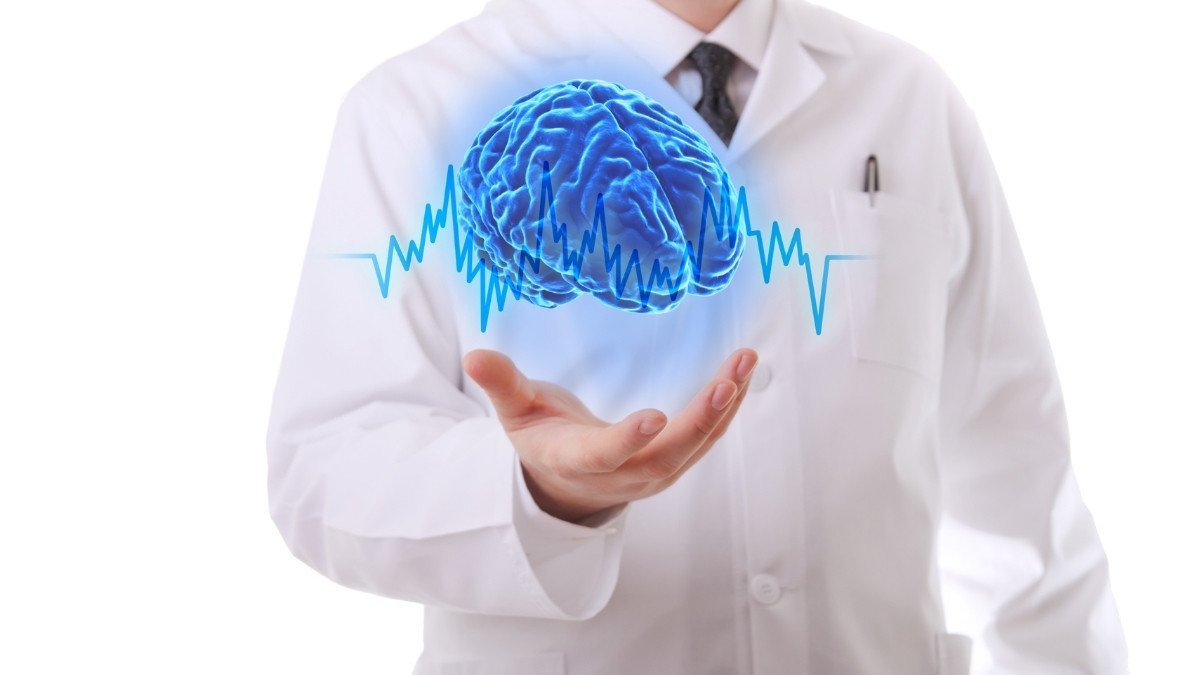
Remember learning to ride a bike? Your body “remembers” how to balance, even if you can’t recall the actual learning process. That’s because your baby brain was running two memory systems:
System 1: Explicit Memory (the stuff you can consciously remember). This system was basically offline for your first few years.
System 2: Implicit Memory (the stuff that shapes your behavior unconsciously). This was working overtime from day one.
Your baby brain was essentially saying: “I don’t need you to remember what happened. I just need you to learn how to be human.”
Pretty smart, right?
The Language Connection That Changes Everything
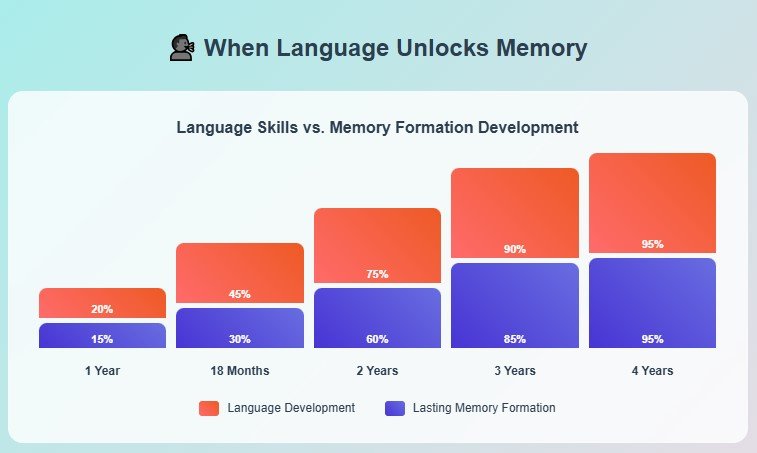
Here’s something that might blow your mind. The end of your memory blackout perfectly coincides with when you started really talking.
Most people’s first memories kick in around age 3.24. Not coincidentally, this is right when kids develop:
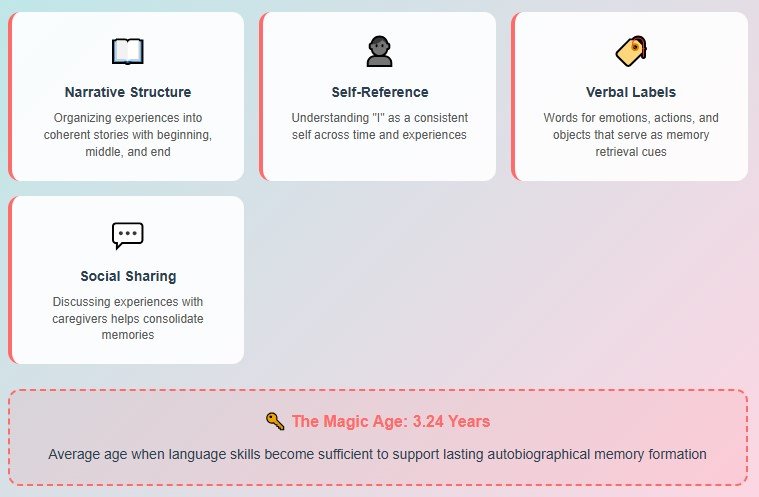
- The ability to tell stories about themselves
- A sense of “self” that exists over time
- Enough vocabulary to label experiences
- Social skills to share memories with others
Scientists call this the “language hypothesis.” Basically, you need words to file memories in a way your future self can access them.
Think about it: How would you remember an experience if you didn’t have the words to describe it?
Cultural Memory Secrets Around the World
🌍 Memory Across Cultures: A Global Perspective
- Rich storytelling traditions
- Individual-focused conversations
- Elaborative parenting styles
- Personal narrative emphasis
- Emotional expression encouraged
- Group-focused identity
- Collective over personal stories
- Hierarchical family structures
- Emotional restraint valued
- Present-focused thinking
This gets fascinating when you look at different cultures.
Asian adults typically report later first memories than Westerners. Why? Their cultures emphasize group identity over individual experiences during early childhood.
Maori adults from New Zealand report the earliest memories of any group studied. Their culture has rich storytelling traditions that help kids organize and retain personal experiences.
The takeaway? Your earliest memories aren’t just biological—they’re shaped by the stories your culture tells about childhood.
The Trauma Exception (Why Some Early Memories Stick)

Here’s something crucial: Highly emotional experiences can break through the amnesia barrier.
Babies who experience trauma can form what researchers call “feeling memories.” These don’t show up as clear recollections. Instead, they manifest as:
- Unexplained fears or phobias
- Behavioral patterns
- Emotional triggers
- Physical sensations
Your body remembers what your mind cannot access. This is why early childhood experiences—good and bad—shape your adult personality so profoundly.
The Revolution That Changed Everything
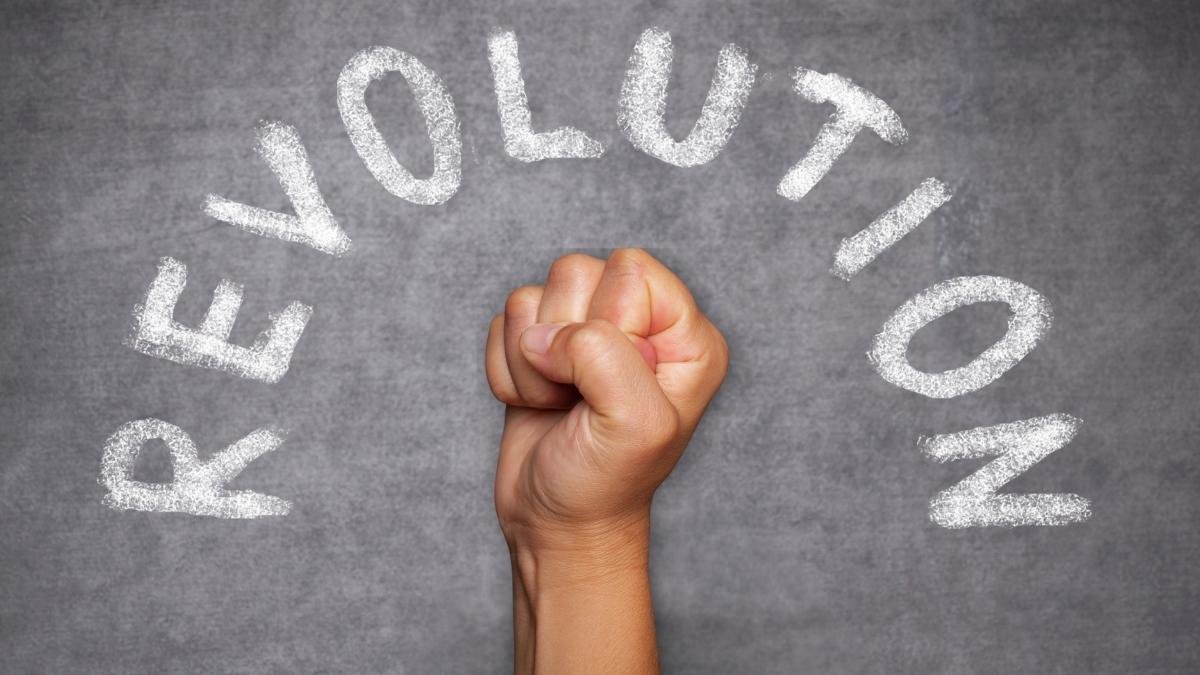
For decades, scientists blamed Freud for the “repressed memories” theory of infantile amnesia. Turns out, he wasn’t even the first to study this phenomenon.
Caroline Miles beat him to it by 17 years, publishing the first scientific report in 1893. But Freud’s dramatic theories about sexual repression grabbed all the attention.
Modern research has completely debunked the repression angle. Instead, we now know the real culprit: neurogenesis.
Your baby’s brain was generating new neurons at breakneck speed. These fresh brain cells were essential for learning, but they literally crowded out existing memories as they integrated into your neural circuits.
The Mind-Blowing Discovery That Changes Everything
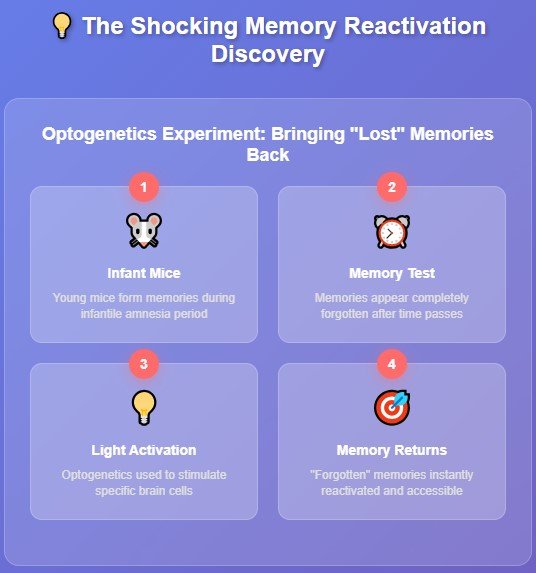
Ready for the most shocking revelation? Those “forgotten” baby memories might still be there.
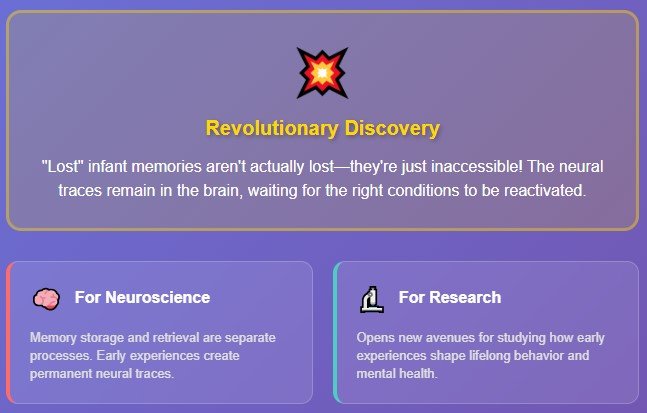
Scientists used a technique called optogenetics (basically, controlling brain cells with light) to reactivate “lost” infant memories in mice. Months after the memories seemed gone forever, they could flip a switch and bring them back.
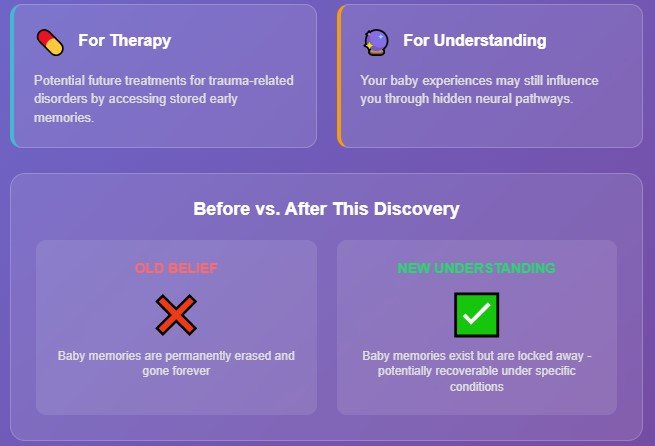
The implications are staggering. Your earliest experiences might be sitting in your brain right now, like files you can’t access because you’ve forgotten the password.
What This Means for You (And Your Kids)
🎯 Real-World Applications: What This Means for You
- Focus on consistent emotional attunement rather than educational activities
- Prioritize secure attachment and responsive caregiving
- Create enriched environments with varied sensory experiences
- Maintain your own mental health – it directly impacts your child’s implicit memory formation
- Don’t stress about “memorable” experiences – focus on daily emotional quality
- Your earliest years created invisible templates for relationships and stress responses
- Unexplained patterns in your behavior may stem from implicit early memories
- Healing can occur through corrective emotional experiences in therapy
- Your attachment style reflects early caregiver interactions you can’t consciously recall
- Early experiences continue influencing you through unconscious pathways
Understanding infantile amnesia isn’t just academic curiosity. It has real-world implications:
For Parents: Focus on emotional experiences over specific activities. Your baby won’t remember their first birthday party, but they’ll carry the feeling of being loved and celebrated.
For Understanding Yourself: Your earliest years created the invisible foundation for everything that came after. Those “forgotten” experiences shaped your attachment style, stress responses, and fundamental beliefs about relationships.
For Healing: Early trauma leaves traces even without conscious memories. But here’s the good news: healing can happen through corrective emotional experiences, even if you can’t remember the original wound.
The Beautiful Logic of Forgetting

Here’s the thing that gets me excited about this research: Forgetting your baby years isn’t a failure—it’s a feature.
Your brain made a trade-off. It chose optimal learning capacity over detailed memory storage. It picked emotional wisdom over episodic recall.
Think about it: What’s more valuable? Remembering every diaper change, or carrying forward the deep sense of security that came from consistent, loving care?
Your baby brain chose wisely.
The Memories That Matter Most
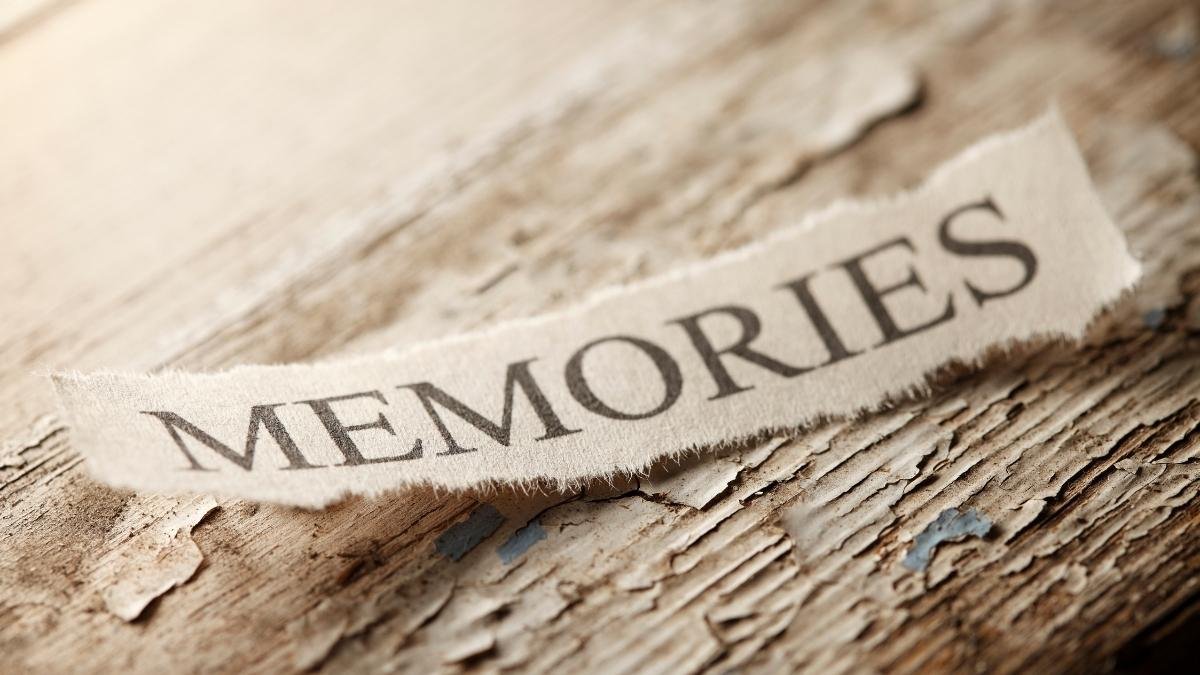
So here’s what I find most beautiful about all this research: The most important memories from your early years are the ones you can’t consciously access.
They live on as:
- The way you approach relationships
- Your baseline sense of safety in the world
- Your capacity for trust and vulnerability
- Your emotional regulation patterns
- Your fundamental beliefs about yourself and others
These aren’t stored as stories you can tell at dinner parties. They’re woven into the fabric of who you are.
Your Invisible Foundation
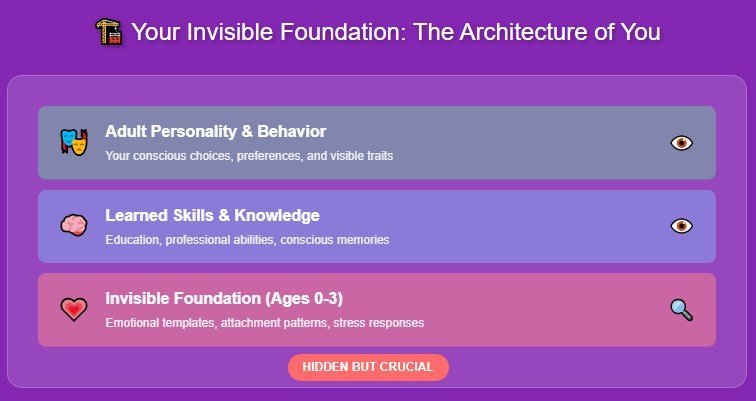
Every time you automatically know how to comfort a crying friend, that’s your baby years talking. When you feel inexplicably safe (or unsafe) in certain situations, that’s those early implicit memories at work.
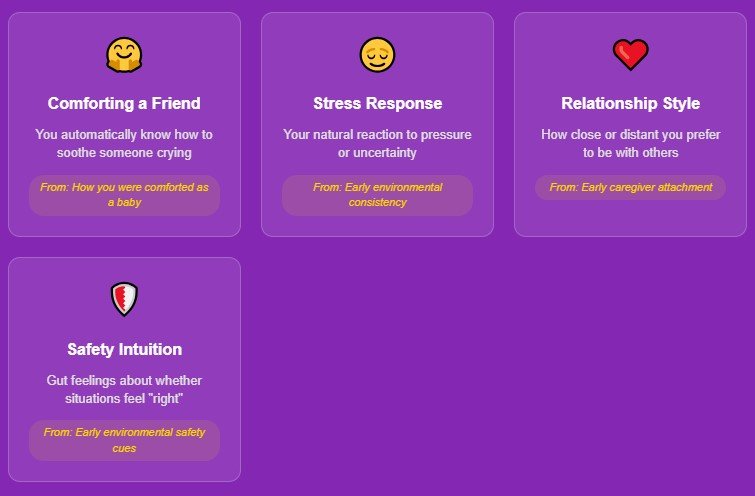
Your first few years didn’t disappear. They became you.
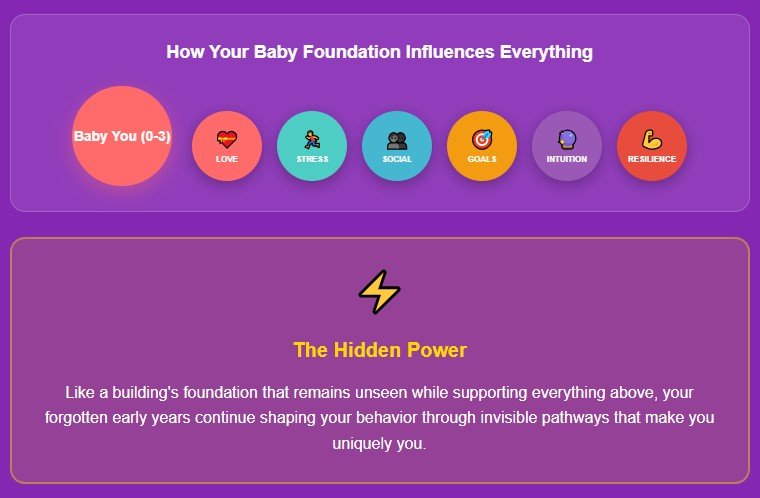
And honestly? That’s way more profound than any specific memory could ever be.
The Bottom Line
You can’t remember being a baby because your brain had bigger priorities than creating vacation slides of your first years. It was busy building the operating system for your entire life.
Those forgotten moments didn’t vanish—they transformed into something more permanent and powerful than conscious memory could ever be.
So the next time you wonder why you can’t recall learning to walk or your first word, remember this: Your baby self made the ultimate sacrifice. They gave up the right to be remembered so that your adult self could have the tools to thrive.
Pretty amazing trade-off, if you ask me.
What’s the earliest memory you can recall? Drop it in the comments—I’m genuinely curious about where your personal memory timeline begins.






